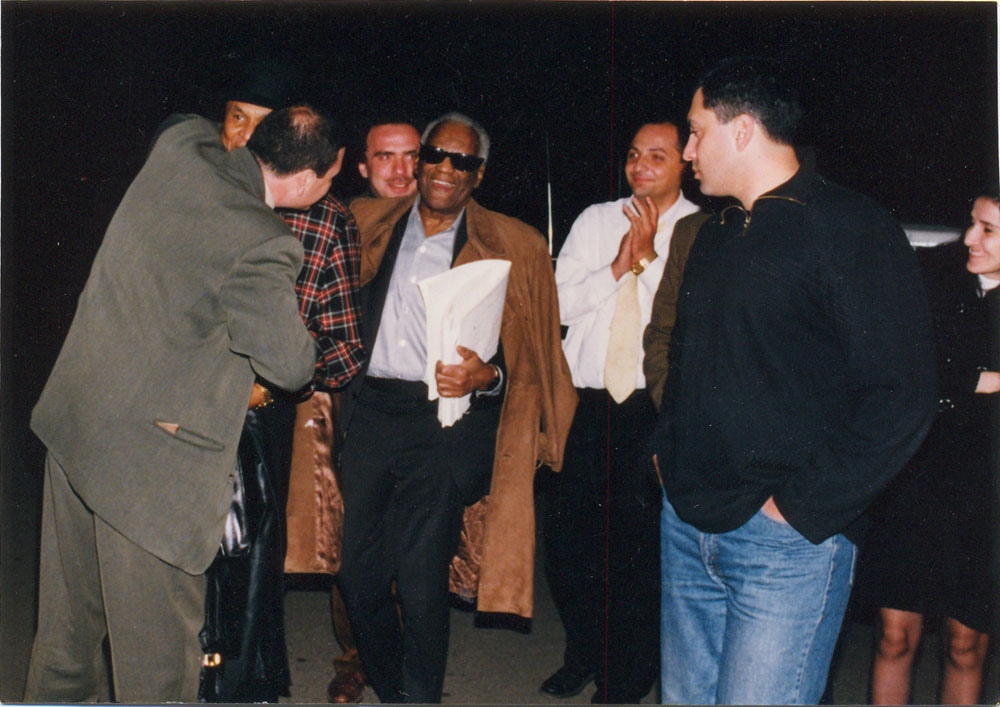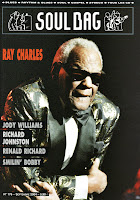On 4 May 2003 CBS aired a documentary, aptly titled
Ray Charles, made by Bill Whitaker.
This CBS broadcast can be identified with an item that was part of
CBS Sunday Morning (a.k.a.
CBS News Sunday Morning; format described
here). It went along with
an introduction on the programme's
webpage, written by Rome Neal, with a storyline almost parallel to the script quoted above.
The title of this introduction -
Ray Charles: Music Is His Life - was the
full title of the documentary. The air date was 4 May 2003. A few sequences were used in this
CBS News item, on Ray's death, on 10 June 2004.
Channel 9 in Australia broadcast the documentary on 18 May 2003, and has shelved it (ID 20030517022; source
here). Interestingly, they also share the original shotlist and script on their archive website. The news angle is that a bio pic on Ray's life (later to be titled
Ray) has gone into production. The program was obviously compiled from archive film and photo footage and newly shot interviews. Also
read this.
Shotlist:
- Ray Charles playing piano and singing and playing saxophone
- Ray Charles IV & RV2S
- Ray on stage playing and performing
- Ray IV again & RV2S
- Old CLIP Ray on stage playing and singing
- Ray IV again
- BW CLIP playing and singing and The Raylettes
- PHOTO
- Ray IV again
- Ray performing on stage with backing singers
- Record and sheet music What'd I Say
- Ray performing & VO singing
- Early PHOTO
- Ray IV again
- FX I Can't Stop Loving You & PHOTOS
- Ray singing for Willie Nelson's 70th
- Willie Nelson IV
- Ray singing and playing electronic keyboard
- Elton John IV
- Ray singing cont.
- Ray IV again & RV2S nod
- Early PHOTOs
- Ray IV again & RV2S
- Ray singing playing piano
- Ray IV again & RV2S
- Recording studio control panel and Ray operating machine
- BW CLIP railway workers
- Negroes dancing; CLIP movie on Ray Charles
- Jamie Foxx IV
- Ray playing piano singing
- RQ & Ray IV again
- Singing on stage
Script:
V.O.: There's no mistaking the voice of Ray Charles. And no stopping him, either. After a childhood of poverty, blindness at the age of 6, and a career that's embraced jazz and country, blues and rock 'n' roll, at the age of 72 he still shows no sign of tiring ... or retiring. Bill Whitaker reports.
[You're my first love you're my last / You're my future you're my past].
V.O.: Ray Charles just can't stop. At 72, he's still making music that grabs the soul.
[All I ever need is you].
R.C.: It really stimulates me. It puts the voltage into me to make me go and that's why when I go out on stage, I give them all of me, not part of me, but everything I got, I give it to them.
[Pause for sax].
V.O.: Ray Charles can't stop the music, because music, he says, is his life.
R.C.: Ever since I was 3 years old, music has always fascinated me. It's like your life blood, huh? Exactly - Lord, I love that, because that's what it is. That's precisely what it is. You can't live without it, huh? No. No. Music is number one in my life - that's it.
V.O.: Cheering all kinds of music. In fact, in his 57 years as an entertainer, he's played just about every American genre - jazz and country, rock-and-roll, ballads and blues. He doesn't discriminate.
R.C.: There's only two kinds of music as far as I'm concerned. Good and bad - that's it. You know, I sincerely believe in that. I just sit there and get into the groove of what the music is dictating. I follow where the music leads me.
V.O.: And it's taken him and us on a fantastic journey - through a revolution in American popular music.
[The sun died with my love / When you left me blue].
V.O.: It took him a while to find his voice. He started off imitating crooner Nat King Cole.
R.C.: I was very frightened to be myself because I could get jobs sounding like Nat Cole. But I told myself, You got to do it. You have to do it, because don't nobody know your name.
[Tell me what I say / Tell me what I say, now / Oh, what'd I say / Tell me what I say tell me what I say].
V.O.: And when he found his style with band and back-up singers The Raylettes, it was explosive and controversial. Ray Charles mixed Saturday night and Sunday morning in a way not heard before.
IV: You were criticised early on for mixing the sacred and the profane.
R.C.: Yeah - the devil's music with God's music. That's the way they used to put it to me. I got a lot of criticism, but what the people didn't realise was all I was doing was being myself.
[Pause for vocal jamming].
V.O.: He created a sound so original, so timeless, that the Library of Congress recently picked
What'd I Say as one of the most significant American recordings and Ray Charles as one of the most influential American artists.
R.C.: I'm a little embarrassed to say this but I've had 'hits' in just about every branch of music.
V.O.: He was already a big R & B star when he decided to make a country album. His record label producers tried to talk him out of it.
R.C.: My attitude was, Well, I probably may lose a few fans, but if I work this right, I think I'll gain more fans then I lose.
[Choir sings: I can't stop loving you].
V.O.: And he did.
[I've made up my mind].
V.O.:
I Can't Stop Loving You hit number one on the country, R & B and pop charts in 1962, and Ray Charles was the most popular singer in the nation.
[I love you in a place].
V.O.: Ray Charles still embraces country music, and country music embraces Ray Charles. He just sang at his good friend Willie Nelson's 70th birthday bash. He did a country music album that was so good, that it brought that kind of music to so many different people all over the world that really, country music took a quantum leap right after that, thanks to Ray Charles.
[What I do, when lightning strikes me].
V.O.: 'Thanks to Ray Charles' - you hear that a lot from musicians. Sir Elton John says Ray Charles's uninhibited soul and unrivalled versatility set many creative spirits free.
E.J.: He was one of the catalysts for me of music. I mean, as a piano player and as a singer, I hear him in so many people. They don't come much better than him.
[What I gotta do to be heard].
V.O.: But it didn't come easy. What have been some of the hard parts?
IV: What's been the hardest for you?
R.C.: Well, the hard parts in my life, when you start out with zero, you know what it is to be poor. You know what it is to be hungry. My brother drowned in front of my eyes when I was about four years old - five, something like that. And then I lost my mum when I was 15, which is tragic. I was in the world alone, you know. And then I fooled around with drugs for a while.
[Hit the road Jack and don't you come back / No more, no more, no more, no more / Hit the road Jack].
V.O.: He hit the road at that young age, crossing the country playing clubs and concerts. He became a notorious womanizer and substance abuser. He had a heroin habit for years.
R.C.: But I was lucky enough to tell myself one day, You got to stop. You know, this is fine. I've been there and done that. OK, so you did it, but it ain't good for you. You need to let it go. And I did exactly that.
V.O.: But he has no regrets.
R.C.: Everything that I look at that happened to me there was a negative, I learned something from it. I got something out of it, you know. It helped me be able to do other things better.
[It's not that easy being green].
V.O.: You may have noticed absent from his list of hardships - his blindness.
R.C.: I look at blindness like an inconvenience. You know how something is inconvenient? I can do 99 - well, maybe I'm stretching it, OK, I'll say 98 - I can do 98% of everything I want to do in my life. The only thing, when I look at myself, that I really can't do is drive a car.
V.O.: He lost his sight at age six to glaucoma. His mother taught him not to feel sorry for himself, but to do for himself.
[Brief pause for guitar].
R.C.: A lot of people when they watch me, they swear that I have to be able to see some, because I do too many things that normally blind people can't do. All the mixes that you hear for my records, I do. So if you hear a record you don't like the mix, you can blame me.
(Laughs).
Georgia, Georgia / The whole day through].
V.O.: From growing up poor in the South to having his own recording company in Los Angeles, he's had experiences enough...
[clapper board claps] ...well, enough to make a movie. The story of his life is in production now.
[Brief pause].
[Jamie Foxx plays Ray Charles.].
J.F.: He's ageless. He's ageless, because we as people, when we got up in the morning we look in the mirror and there's been a few years has gone by. And we say, Oh, my face, I've got a wrinkle, I got this. He's never done that.
[Brief pause].
V.O.: After 57 years, you'd think he'd earned the right to slow down, but he's still recording, still touring, still making music.
IV: Can you ever see yourself retiring from music?
R.C.: And do what? Sit back and rest on your laurels and take your money and live in luxury. Gee, man, give me a break. You think I can let my life go in front of my face like that? I can't do that. No, you know, music is what I love. Music is my life. I'm going to continue to do what I do, because I love what I do.
[Oh, what you trying to do to me].
V.O.: Ray Charles just can't stop.
[I'm going to need you baby / All I ever needed - you].






+Val+Wilmer+-19630512.jpg)
%2BVal%2BWilmer%2B-19630512.jpg)







+Rex+Features+-+19630512.jpg)
+Rex+Features+2+-+19630512.jpg)

































